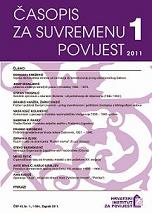Komunizam u percepciji hrvatske nacionalističke inteligencije 1938.–1945. godine
COMMUNISM IN THE PERCEPTION OF THE NATIONALIST INTELLIGENTSIA, 1938-1945
Author(s): Nada Kisić KolanovićSubject(s): History
Published by: Hrvatski institut za povijest
Keywords: Croatian nationalism; the Independent State of Croatia; Communism; Fascism
Summary/Abstract: This article is concerned with the cultural activity of Croatian national intellectuals from the late 1930s to 1945. Historical research into and interpretation of this issue, without which it is impossible to write a synthesis of the intellectual projects of modern Croatia, includes two assumptions. The first presupposes the wartime whirlwind of 1941-1945 in which two possible political strongholds appear for the renewal of the Croatian state: a nationalist one, as an independent Croatian state and a communist one, as a federal Croatia within the framework of a new Yugoslavia. The second assumption presupposes that the conflict of nationalists and communists had cultural implications due to which concrete historical events also obtained their metaphoric function. As a result the anti-communism of the nationalist intellectuals is viewed as a discursive construct. When speaking about the public discourse on Croatian identity 1941-1945 the nationalist definition of this identity starts from the stereotype that Croatia is always defending itself from the East dating back to the Ottoman period. Nationalist tensions towards communism in 1941 recast the “East” into the communism of the USSR seeing it as a new imperialistic expression which will sever the organic tie of Croatia with the civilization and cultural values of the West. In the uncertain wartime realities Ustaša nationalism develops defensive characteristics towards Western Europe and in large part utilizes the stereotype of victimized nation. The defensive line of cultural identity in 1941-1945 can be read in the numerous cultural reflections on permanent retreat, on futile historical sacrifice for western European values, etc. Such a manner of recognizing one’s own identity had the purpose of pushing Croatia from the periphery to the centre stage of the interests of the western democratic powers and engaging them in the survival of the “Croatian state” as a borderland of Europe vis-à-vis the Soviet Communist Bloc. This entire context of cultural identification becomes problematic the minute the ruling group of right-wing nationalists positions its anti-communism alongside fascism and National Socialism and recognizes these as kindred ideologies. Perhaps it could be added that anti-communism becomes the point from which the nationalists disconnect from “civil society” and political democracy and connect to National Socialism and fascism. This issue is analyzed in the article on the basis of the writings of three intellectuals who were also state officials in the Independent State of Croatia. Generally speaking, in the late 1930s it is almost impossible to speak about open contacts between Croatian nationalist intellectuals and fascism and National Socialism without Ante Pavelić, the leader of the Ustaša movement who spent his middle age in political emigration in Italy (1929-1941). Fascism became close to Pavelić in the sense of his personal political experience.
Journal: Časopis za suvremenu povijest
- Issue Year: 43/2011
- Issue No: 1
- Page Range: 107-136
- Page Count: 30
- Language: Croatian

